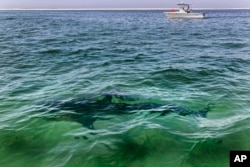Recent shark bites in Florida and Hawaii and a suspected case in New Jersey have raised an age-old summer question for beachgoers — is it safe to go in the water?
Scientists and researchers who study sharks said the answer to that question is yes, it is safe. Dangerous interactions between humans and sharks are uncommon, and serious injuries and deaths from the bites are rare and growing rarer, scientists said.
Still, the extraordinary nature of shark bites and the stories of survivors capture the imagination. In April, the story of a Hawaii surfer fighting off a shark got widespread public attention, for example. But, it is a good idea to remember just how rare shark bites truly are, scientists said.
How often do shark bites occur?
There have been around 70 to 80 unprovoked shark bites yearly, worldwide, over the past 10 years. And not only are shark bites rare, they have been especially rare recently.
There were only 57 unprovoked bites last year, and just five of them were deadly, reports the University of Florida's International Shark Attack File. There had been nine such deaths in 2021.
The shark attack file reported a year ago that one reason for the drop in bites might be the decrease of shark populations around the world.
It is too early in the warm season to get an idea of how active this year will be for interactions between humans and sharks, said Greg Skomal. He is a shark expert with the Massachusetts Division of Marine Fisheries.
“If we get lots of bait fish and forage fish species close to shore, we have a super hot summer that draws people to beaches, more people in the water, then we can determine the risk,” Skomal said.
What are the most prone areas for shark encounters?
The United States and Australia are the sites of the most reported shark bites. The state of Florida led the world last year with 16 unprovoked bites, the shark attack file said.
This month, two Florida fishermen were bitten by sharks in separate incidents less than 36 hours apart.
The rate of shark bites has stayed steady in recent years. But, people may think attacks are more common because of new technology to report shark sightings, said Nick Whitney, a lead scientist at the New England Aquarium in Boston. Recently developed smartphone apps permit users to report shark sightings in real time.
What kind of sharks are cause for concern?
White sharks, bull sharks and tiger sharks are the sharks most cited by the International Shark Attack File for unprovoked bites. They are large sharks that also cause the most deaths.
However, remember that many interactions with sharks are with smaller species that are unlikely to cause serious injuries, said James Sulikowski, director of the Coastal Oregon Marine Experiment Station at Oregon State University. Those sharks might bite a human, realize we are not their desired prey and move on, he said.
Is it safe to swim?
You are at much greater risk of getting hurt in a car accident on the way to the ocean than you are to get seriously injured by a shark bite when you are there.
Millions of people go to the ocean in the summer as the weather heats up, and that raises the possibility of interacting with a shark. But by taking simple steps, visitors can reduce any chance of a dangerous interaction with a shark, Sulikowski said. Such steps include avoiding the water early and late in the day when most sharks hunt for food. You should also not carry anything shiny into the water.
“We are intruders in their environment. What we can do is be logical and safe about that and avoid areas where sharks are going to be feeding,” Sulikowski said. “When an interaction occurs, it's mistaken identity — we are in an area where a shark is looking to eat.”
I’m Caty Weaver.
The Associated Press reported this story. Caty Weaver adapted it for Learning English.
_______________________________________________________________________
Words in This Story
provoke –v. to stir up purposely; to incite to anger
bait –n. something (such as food) used in luring especially to a hook or trap
forage –v. to wander in search of forage or food
species - a class of things of the same kind and with the same name
prey –n. an animal taken by a predator as food
logical –n. capable of reasoning or of using reason in an orderly cogent fashion
intruder –n. to thrust oneself in without invitation, permission, or welcome
occur –v. to happen; to come into existence
______________________________________________________________________
We want to hear from you. What wild animals do you find frightening?
Here is how our comment system works:
- Write your comment in the box.
- Under the box, you can see four images for social media accounts. They are for Disqus, Facebook, Twitter and Google.
- Click on one image and a box appears. Enter the login for your social media account. Or you may create one on the Disqus system. It is the blue circle with “D” on it. It is free.
Each time you return to comment on the Learning English site, you can use your account and see your comments and replies to them. Our comment policy is here.







Forum